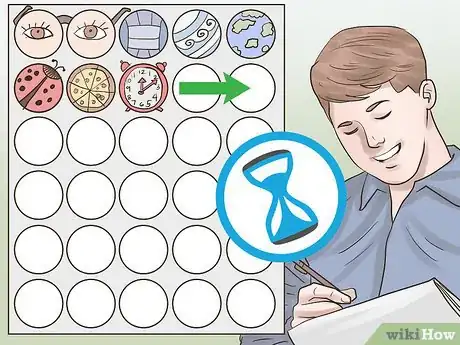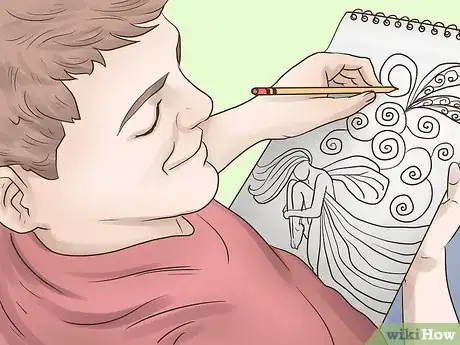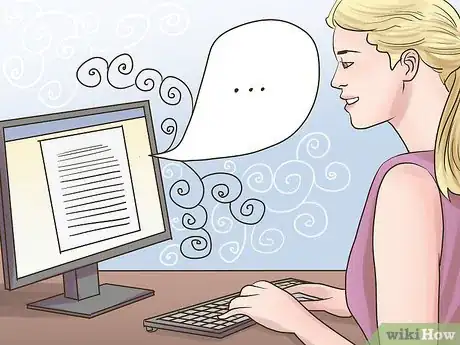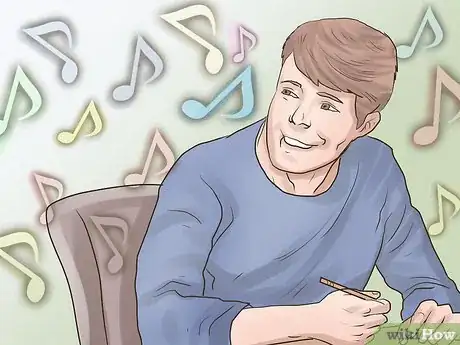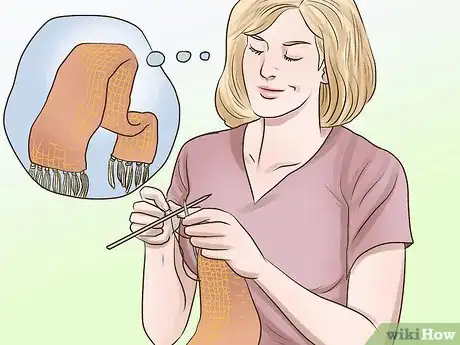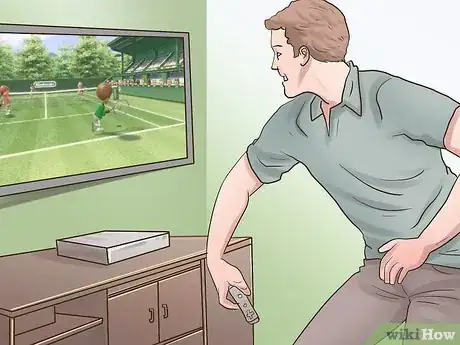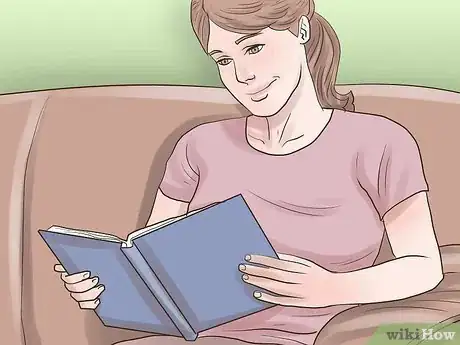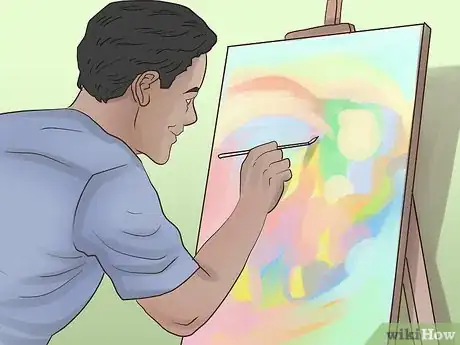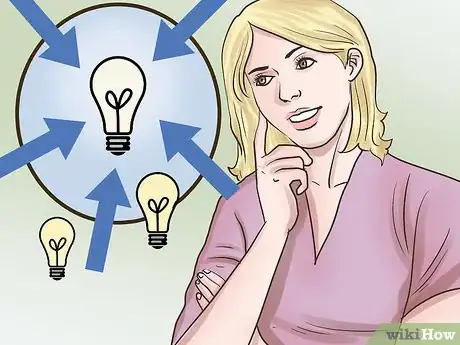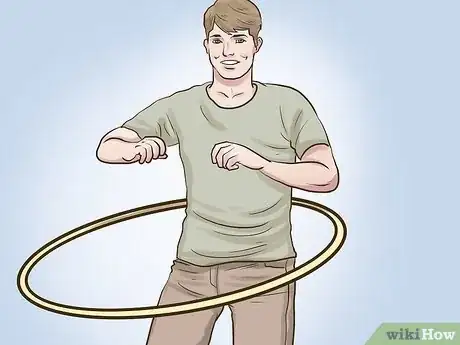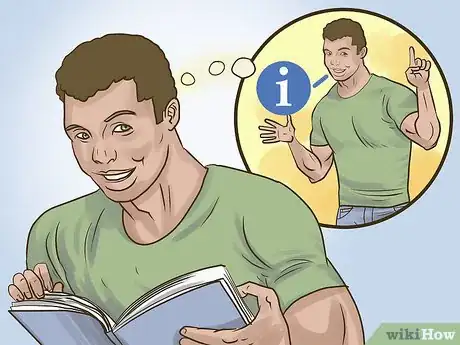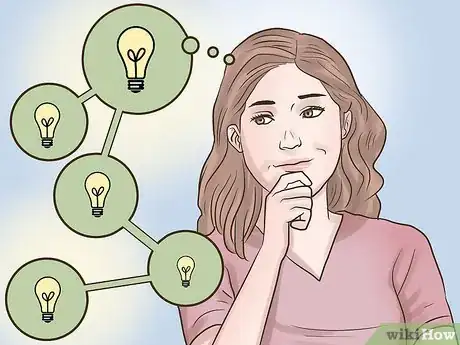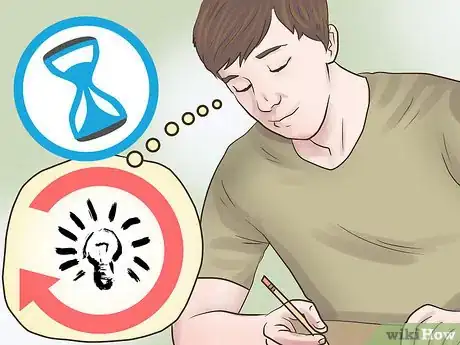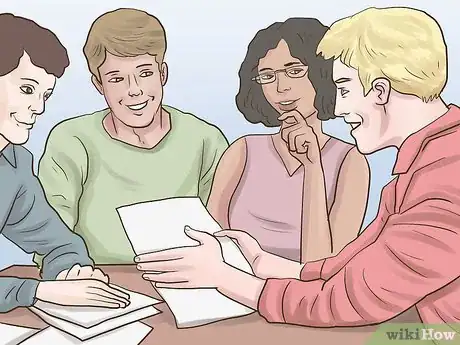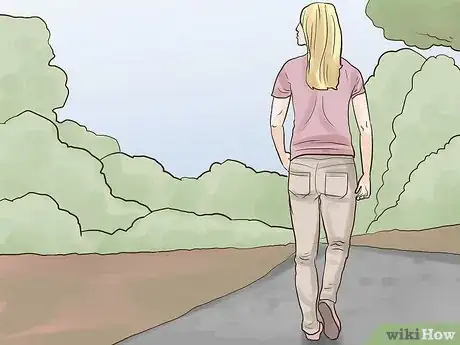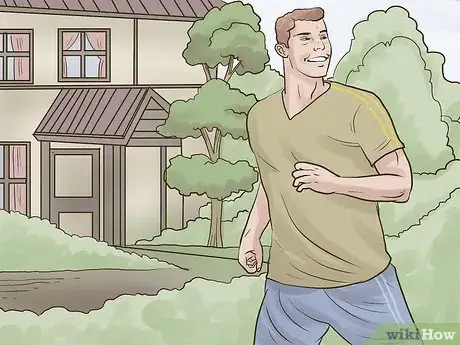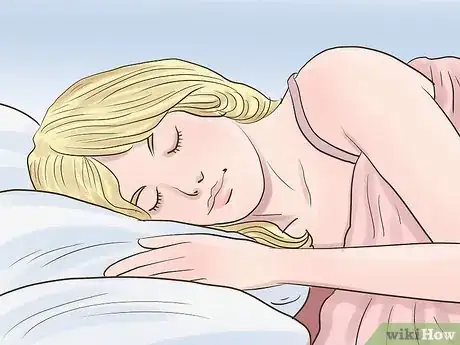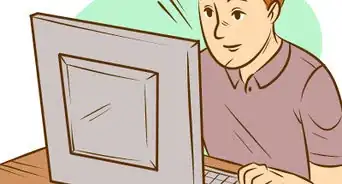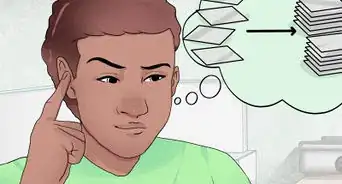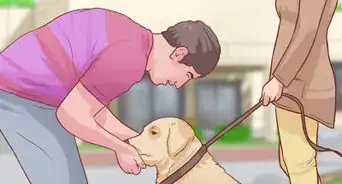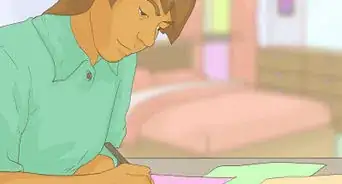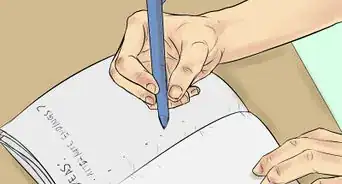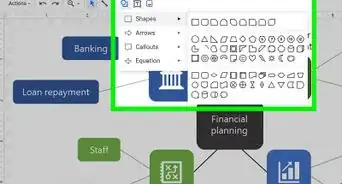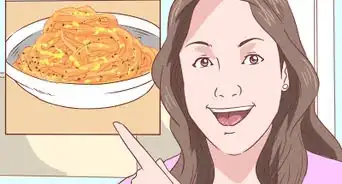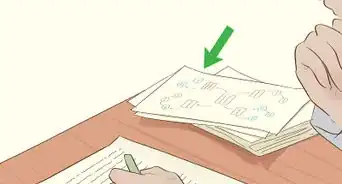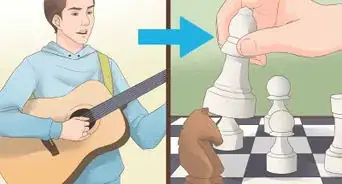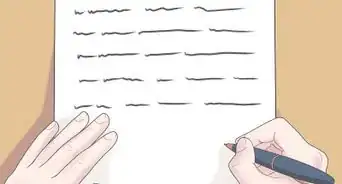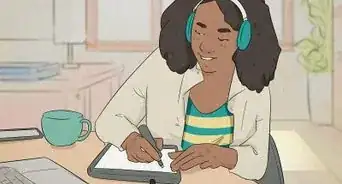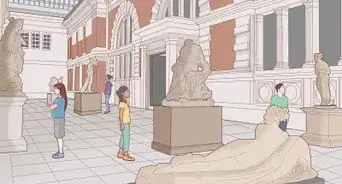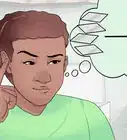This article was co-authored by Joui Turandot. Joui Turandot is a Personal and Creative Branding Consultant and the Founder of JTM Consulting, a business that specializes in public persona branding, business branding, creative leadership coaching, and speaking workshops. Joui has more than 10 years of experience as a fashion designer, filmmaker, photographer, costume designer, stylist, and personal development coach. She uses her diverse experience to guide creative leaders and entrepreneurs through a journey of self-discovery and embodied personal expression to help them grow their business and step into the next level of leadership. Joui holds a BA in Media Studies from Mills College and holds credentials in the Somatica Core Training Method by the Somatica Institute and in the Art of Circling Training by The Circling Institute.
There are 14 references cited in this article, which can be found at the bottom of the page.
wikiHow marks an article as reader-approved once it receives enough positive feedback. This article received 28 testimonials and 85% of readers who voted found it helpful, earning it our reader-approved status.
This article has been viewed 1,320,259 times.
Creativity is a skill that you can work on with time, training, and effort.[1] There are many areas you can focus on to improve your overall creativity. Engage in creative exercises like reading, writing, and listening to music to sharpen your creativity. Learn as much as possible and open yourself up to new ideas and experiences. Make lifestyle changes like walking more, exercising regularly, and getting more sleep to give your brain the boost it needs to increase your creative skills.
Steps
Challenging Yourself with Creative Exercises
-
1Do the 30 circle test. You can do this test during dull moments at work. It helps you push yourself to think quickly and creatively. To start, draw 30 circles. From there, make as many circles into drawings as possible in one minute. You can do the test over and over again, trying to break your record each time.[2]
- The 30 Circle Test helps boost creativity because it forces you to embrace multiple ideas. Many people have a tendency to self-edit and pause to wonder if something is a good idea. The 30 Circle Test forces you to think fast, forcing you to experiment with ideas without rejecting them.
- For printable sheets of empty circles, do an Internet search for "30 circles printable".
-
2Doodle in your spare time. Doodling is sometimes thought of as a childish pastime, but it can actually help increase productivity. This can increase creativity by increasing your engagement with the world and attention span. Doodling helps you stay engaged during activities where you would otherwise zone out. The more information you're able to absorb, the more creative you will be.[3]
- Doodle during activities where you feel your mind wandering. For example, if you find yourself drifting out of focus during a meeting at work, do some doodling. You can also doodle in school during boring lectures.
- Try keeping a sketchbook where you doodle when you start to feel bored or disengaged.
Advertisement -
3Write flash fiction. Flash fiction means very short stories, often no more than 100 words. Writing a flash fiction story will help you become more creative as you'll be forced to tell a fleshed out story with a beginning, middle, and end using only a small number of words. This will help you learn how to convey necessary information in a limited space.[4]
- There are many flash fiction writing communities online. Try getting involved with a flash fiction writing community and responding to prompts and participating in contests.
-
4Listen to music. Simply playing music in the background can inspire you creatively. It can help you focus better and increase your overall concentration. Classical music tends to work particularly well for creativity and concentration.[5]
- Not every genre of music works for everyone. While classical music has beneficial effects for many, experiment a little to find the music that best helps you concentrate and feel creative.
-
5Make something with your hands. Using your hands to create means you get information from all of your senses. This can help encourage more creative thinking. If you want to feel more creative, try activities in which you create using your hands. For example, try something like knitting, sewing, or other crafts to bolster your creativity.
- Other activities like arranging your bedroom, cooking, calligraphy—anything that has an inkling of creativity—can help you build your creative muscles.[6]
-
6Play video games. Some video games are actually good for the creative mind. Interactive games that require movement as these stimulate multiple senses help with creative thinking. Things like Wii Tennis or Dance Dance Revolution would work well. Avoid games that require you to sit for long periods.[7]
-
7Read more. Reading is great for your creative mind. Make a habit of reading regularly. Pick books from multiple genres and styles of writing to expand your horizons and really bolster your creativity. Try to make time to read every day.[8]
- Try joining a book club. This will help direct your reading if you're unsure what kinds of books to start with.
- Get a library card. This will help you save some money on books.
Broadening Your Knowledge
-
1Develop your expertise. Part of being creative is gaining expertise in one area or medium and learning as much as you can about it. Begin by reading articles and watching videos on the subject to gather more information about it. If possible, sign up for an introductory course at a local college or community centre (e.g. a beginner painting class).[9]
- Inspire yourself by experiencing the creative works of others in a medium that interests you. For instance, if you are learning how to paint, visit a museum or art gallery.
-
2Be open to new experiences. The most creative people are willing to engage with multiple ideas, broaden their horizons, and be surprised. Avoid resisting and dismissing things that are unfamiliar to you, and accept opportunities to try new creative endeavors. For instance, attempt a medium like clay sculpting even if you believe that you will dislike it or be bad at it.
-
3Use play to foster creativity. Being more childlike can help your creative side by freeing you from adult hang ups for a while and opening your mind. Use toys and art supplies to stimulate your imagination and make new connections. If you're short on creative ideas, take the time to draw a whimsical picture or play with building blocks or legos.[10]
-
4Share and explain your knowledge. They say that you remember 90% of what you learned by teaching it to someone else. Explaining your newfound knowledge to yourself and others can help to cement it in your own mind. While you are learning something new, make a point of explaining it to yourself in your head. Picture yourself giving a TED talk or tutoring someone on the topic. [11]
- If you feel particularly confident, make a video about the topic to post online, or explain your knowledge to a friend or colleague.
-
5Prompt yourself to think of new ideas. Engage in activities that actively force you to think of new ideas. For instance, play word association games by writing down one word and then any words that connect to it. Use analogy to find similarities between two seemingly dissimilar things to break down and examine your associations with each.[12]
- For instance, look for similarities between a textbook and an iPod.
- If you feel stuck, try some word association games or search for synonyms online.
- A similar idea is a game sometimes called "Word Melt", in which you change words into other words, by changing one letter at a time. For example — WORD → WARD → WART → WALT → MALT → MELT
-
6Set aside time for brainstorming. Creativity takes practice, so set aside time each day to retreat to a quiet or inspiring place to generate new ideas. For instance, visit a quiet park or sit in a library and let your mind flow freely. Write all of your ideas (good or bad) in a notebook, on a whiteboard, or on your computer without stopping to edit or rethink them.[13]
- Find a time that will work for you regularly. If you always have time after dinner, for example, take an hour after dinnertime to turn off distractions and engage with new ideas.
- You don't even have to know what you're going to do with this brainstorming time. Just let yourself be. Let whatever inspiration comes come, and if none does, keep going and eventually it will.[14]
Changing Your Lifestyle
-
1Socialize with different people. To give your creativity a jump-start, socialize as much as you can, particularly with people who are different from you. Spending time with people whose life experience and world view is unlike yours can expand your mind and offer fresh perspective on everyday things. To meet new people, attend events or do activities that are outside of your normal routine and engage in conversation whenever possible.[15]
- For instance, if the art world is new to you, visit a gallery or museum and strike up a conversation with an artist or patron. Break the ice by saying something like, "I'm new to the art world. Is this a passion of yours?"
- Try varying your established routes to increase the chances you’ll meet new people.
-
2Walk when possible. Walking can provide you time to think over ideas by allowing you to zone out and engage with creative thoughts. Walking will also allow you to engage with new surroundings or nature, both of which may inspire your creativity. Make a point of walking several times a week for at least fifteen minutes, or everyday if possible.[16]
-
3
-
4Get enough sleep. Sleep can help your mind stay rested and refreshed, leaving you creatively recharged. The brain is also very active during sleep, so "sleeping on a problem" may allow your mind to re-evaluate connections and formulate new ideas about an issue.[18] Strive to get a solid 8 to 9 hours sleep each night, and stay on a sleep schedule.[19]
Expert Q&A
Did you know you can get expert answers for this article?
Unlock expert answers by supporting wikiHow
-
QuestionHow do I start being creative?
 Joui TurandotJoui Turandot is a Personal and Creative Branding Consultant and the Founder of JTM Consulting, a business that specializes in public persona branding, business branding, creative leadership coaching, and speaking workshops. Joui has more than 10 years of experience as a fashion designer, filmmaker, photographer, costume designer, stylist, and personal development coach. She uses her diverse experience to guide creative leaders and entrepreneurs through a journey of self-discovery and embodied personal expression to help them grow their business and step into the next level of leadership. Joui holds a BA in Media Studies from Mills College and holds credentials in the Somatica Core Training Method by the Somatica Institute and in the Art of Circling Training by The Circling Institute.
Joui TurandotJoui Turandot is a Personal and Creative Branding Consultant and the Founder of JTM Consulting, a business that specializes in public persona branding, business branding, creative leadership coaching, and speaking workshops. Joui has more than 10 years of experience as a fashion designer, filmmaker, photographer, costume designer, stylist, and personal development coach. She uses her diverse experience to guide creative leaders and entrepreneurs through a journey of self-discovery and embodied personal expression to help them grow their business and step into the next level of leadership. Joui holds a BA in Media Studies from Mills College and holds credentials in the Somatica Core Training Method by the Somatica Institute and in the Art of Circling Training by The Circling Institute.
Creative Leadership Coach First, start by appreciating the creativity you already have and remembering that creativity is a skill/muscle that can be exercised and strengthened. Then, try out new things that get your juices flowing. The important thing is to commit to practicing creativity regularly—once a day or once a week.
First, start by appreciating the creativity you already have and remembering that creativity is a skill/muscle that can be exercised and strengthened. Then, try out new things that get your juices flowing. The important thing is to commit to practicing creativity regularly—once a day or once a week. -
QuestionHow can I be creative all the time?
 Klare Heston, LCSWKlare Heston is a Licensed Independent Clinical Social Worker based in Cleveland, Ohio. With experience in academic counseling and clinical supervision, Klare received her Master of Social Work from the Virginia Commonwealth University in 1983. She also holds a 2-Year Post-Graduate Certificate from the Gestalt Institute of Cleveland, as well as certification in Family Therapy, Supervision, Mediation, and Trauma Recovery and Treatment (EMDR).
Klare Heston, LCSWKlare Heston is a Licensed Independent Clinical Social Worker based in Cleveland, Ohio. With experience in academic counseling and clinical supervision, Klare received her Master of Social Work from the Virginia Commonwealth University in 1983. She also holds a 2-Year Post-Graduate Certificate from the Gestalt Institute of Cleveland, as well as certification in Family Therapy, Supervision, Mediation, and Trauma Recovery and Treatment (EMDR).
Licensed Social Worker
-
QuestionHow do you get creative?
 Klare Heston, LCSWKlare Heston is a Licensed Independent Clinical Social Worker based in Cleveland, Ohio. With experience in academic counseling and clinical supervision, Klare received her Master of Social Work from the Virginia Commonwealth University in 1983. She also holds a 2-Year Post-Graduate Certificate from the Gestalt Institute of Cleveland, as well as certification in Family Therapy, Supervision, Mediation, and Trauma Recovery and Treatment (EMDR).
Klare Heston, LCSWKlare Heston is a Licensed Independent Clinical Social Worker based in Cleveland, Ohio. With experience in academic counseling and clinical supervision, Klare received her Master of Social Work from the Virginia Commonwealth University in 1983. She also holds a 2-Year Post-Graduate Certificate from the Gestalt Institute of Cleveland, as well as certification in Family Therapy, Supervision, Mediation, and Trauma Recovery and Treatment (EMDR).
Licensed Social Worker
References
- ↑ Joui Turandot. Branding Consultant. Expert Interview. 4 June 2020.
- ↑ https://web.stanford.edu/group/sdgc/cgi-bin/ycisl/?p=1859
- ↑ https://www.health.harvard.edu/blog/the-thinking-benefits-of-doodling-2016121510844
- ↑ https://www.theguardian.com/books/2012/may/14/how-to-write-flash-fiction
- ↑ https://greatergood.berkeley.edu/article/item/how_music_helps_us_be_more_creative
- ↑ Joui Turandot. Branding Consultant. Expert Interview. 4 June 2020.
- ↑ https://myweb.fsu.edu/vshute/pdf/rahimi_shute.pdf
- ↑ https://www.psychologytoday.com/blog/hot-thought/201005/how-be-creative
- ↑ http://www.huffingtonpost.com/2013/09/05/be-more-creative_n_3873717.html
- ↑ http://www.huffingtonpost.com/2013/09/05/be-more-creative_n_3873717.html
- ↑ https://www.fastcompany.com/3044865/3-ways-to-train-yourself-to-be-more-creative
- ↑ http://www.huffingtonpost.com/2013/09/05/be-more-creative_n_3873717.html
- ↑ http://www.huffingtonpost.com/2013/09/05/be-more-creative_n_3873717.html
- ↑ Joui Turandot. Branding Consultant. Expert Interview. 4 June 2020.
- ↑ https://www.psychologytoday.com/us/blog/social-influence/202201/7-easy-ways-become-more-likable
- ↑ http://news.stanford.edu/2014/04/24/walking-vs-sitting-042414/?sf2973344=1
- ↑ https://medlineplus.gov/benefitsofexercise.html
- ↑ https://www.psychologytoday.com/blog/conquering-cyber-overload/201005/sleep-success-creativity-and-the-neuroscience-sleep
- ↑ https://www.cdc.gov/sleep/about_sleep/how_much_sleep.html
About This Article
To be creative, try to be open to new experiences, like taking a sculpting class, so you can engage with new ideas. Additionally, play with a toy or art supplies to generate creative ideas by freeing your mind from daily concerns. You can also try prompting yourself to come up with new ideas by doing activities like word association games. For example, write down a word, then make a list of synonyms for that word. For tips on how to do the 30 circle test, keep reading!

